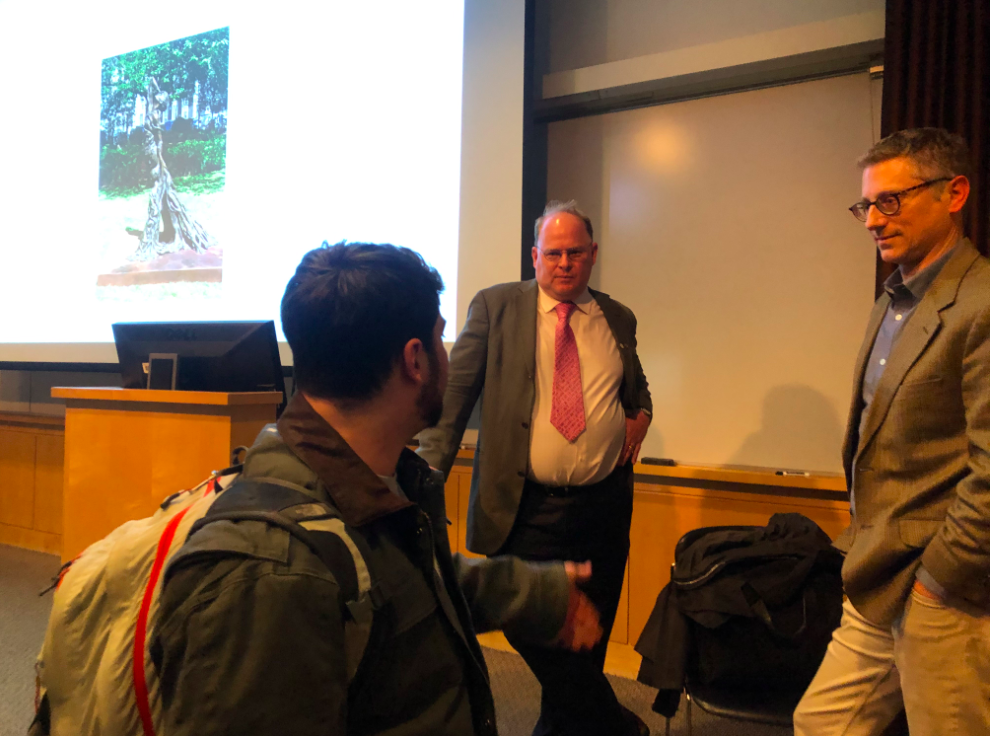
Kenneth Ruoff, Professor of History and Director of The Center for Japanese Studies at Portland State University, gave a presentation on Feb. 17 entitled “The Use and Abuse of History in Japan and Korea.” The talk took place in Miller 105, and was co-sponsored by Lewis & Clark’s Asian Studies Program and History Department.
Ruoff has written multiple books and is considered a global expert on Japan’s imperial house. He received the Osaragi Jirō Prize for commentary, Japan’s equivalent of the Pulitzer Prize, for his book “The People’s Emperor” in 2004.
Ruoff was introduced by Andrew Bernstein, associate professor of history.
“He is really one of the world’s foremost authorities on the history of the Japanese monarchy in modern times,” Bernstein said.
South Korea was under imperial Japanese rule from 1910 to 1945. In 1965, the two countries signed the Treaty on Basic Relations, which included a large payment from Japan to South Korea, settling all issues of compensation and property from the imperial era.
This treaty has become a focal point of the recent Japan-Korea conflict, as the two countries disagree over whether Japan has sufficiently apologized for the WWII comfort women issue, and compensated the victims.
“The ‘comfort women’ were women in areas occupied by Imperial Japan who were coerced into having sex with Japanese soldiers at ‘comfort stations,’” Bernstein explained via email. “Most of them were Korean, so memories of their suffering have played a large role in the ‘history wars’ that have strained relations between Korea and Japan.”
The comfort women issue came to light in the ’90s, and had not been a consideration of the 1965 treaty.
“A lot of Korean women who had been forced into comfort stations didn’t want to reveal that fact after the war, because of the stigma,” Bernstein said. “But by the 1990’s these women had grown quite old, and wanted to tell their stories before they passed away.”
In 1993, the Japanese government issued the Kono Statement, which announced the results of a study uncovering the employment of comfort women in military brothels during WWII.
“(The statement) was admittedly acrobatics by the Japanese government … to create a compensation fund for comfort women that was non-governmental enough that the Japanese government could still claim that the 1965 treaty governed relations between Japan and Korea when it came to anything to do with the colonial period,” Ruoff said.
A 1998 joint declaration between the two countries called for reconciliation and positive future relationships. However, the comfort women issue persisted as many Koreans felt that compensation was necessary, but civil groups in Japan felt they should not have to apologize.
“(Japanese civil groups) started to conclude that anti-Japanese nationalism is such a useful and powerful unifying force in Korea that the Korean elites had no real intention of discarding it no matter what Japan did,” Ruoff said. “There is a genuine apology fatigue in Japan.”
In 2015, a Japan-Korea agreement created the Reconciliation and Healing Foundation. Japan provided $8.8 million to settle the comfort women issue by providing support for victims and their families.
In 2018, a Korean Supreme Court decision mandated that Japan’s Nippon Steel compensate South Koreans who worked under forced labor during WWII. As relations continued to fray, South Korea announced it would close the Reconciliation and Healing Foundation that December.
Ruoff pointed to broader lessons for how citizens perceive their nation’s history.
“I doubt that I need to remind all present that the reaction to attacks on the invented dignity of the nation state, and backsliding on recognizing dark chapters in national history, is hardly unique to Japan,” Ruoff said. “It is obviously going on in our own country.”
In the bigger picture, Ruoff argues against talking about humans rights issues, such as sexual violence against women, in nationalist contexts.
“I think it would be useful to take the nationalism out of this, but obviously that’s not happening any time soon,” Ruoff said. “(Sexual violence) is a really, really important human rights issue. It speaks to much broader topics.”
Bernstein spoke to what he hopes students got out of the presentation.
“Too often, ”Bernstein said. “People will point out the crimes committed by other nations without reflecting on the faults of their own nations.”
Subscribe to the Mossy Log Newsletter
Stay up to date with the goings-on at Lewis & Clark! Get the top stories or your favorite section delivered to your inbox whenever we release a new issue.

Leave a Reply